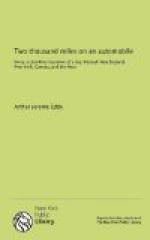The longer we look at anything, however simple, the deeper it penetrates into our being until it becomes a part of us. In time we learn to know the tree that shades our porch, but years elapse before we are on friendly terms, and a lifetime is spent before the gnarled giant admits us to intimate companionship. Trees are filled with reserve; when denuded of their neighbors, they stand in melancholy solitude until the leaves fall for the last time, until their branches wither, and their trunks ring hollow with decay.
And if we never really see or know or understand the nature which is about us, how is it possible that we should ever comprehend the people we meet? What is the use of trying to know an Englishman or a Frenchman when we do not know an American? What is the use of struggling with the obstacle of a foreign tongue, when our own will not suffice for the communication of thoughts? The only light that we have is at home; travellers are men groping in the dark; they fancy they see much, but for the most part they see nothing. No great teacher has ever been a great traveller. Buddha, Confucius, and Mahomet never left the confines of their respective countries. Plato lived in Athens; Shakespeare travelled between London and Stratford; these great souls found it quite sufficient to know themselves and the vast universe as reflected from the eyes of those about them. But then they are the exceptions.
For most men—including geniuses—travel and deliberate observation are good, since most men will not observe at home. Such is the singularity of our nature that we ignore the interesting at home to study the commonplace abroad. We never notice a narrow and crooked street in Boston or lower New York, whereas a narrow and crooked street in London fills us with an ecstasy of delight. We never visit the Metropolitan Art Museum, but we cross Europe to visit galleries of lesser interest. We choose a night boat down the majestic Hudson, and we suffer untold discomforts by day on crowded little boats paddling down the comparatively insignificant Rhine.
Every country possesses its own peculiar advantages and beauties. There is no desert so barren, no mountains so bleak, no woods so wild that to those who dwell therein their home is not beautiful. The Esquimau would not exchange his blinding waste of snow and dark fields of water for the luxuriance of tropic vegetation. Why should we exchange the glories of the land we live in for the footworn and sight-worn, the thumbed and fingered beauties of other lands? If we desire novelty and adventure, seek it in the unexplored regions of the great Northwest; if we crave grandeur, visit the Yellowstone and the fastnesses of the Rockies; if we wish the sublime, gaze in the mighty chasm of the Canon of the Colorado, where strong men weep as they look down; if we seek desolation, traverse the alkali plains of Arizona where the trails are marked by bones of men and beasts; but if the heart yearns for beauty more serene, go forth among the habitations of men where fields are green and sheltering woods offer refuge from the noonday sun, where rivers ripple with laughter, and the great lakes smile in soft content.




